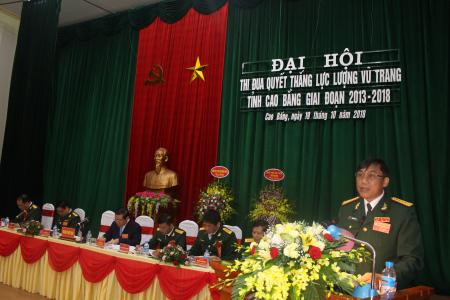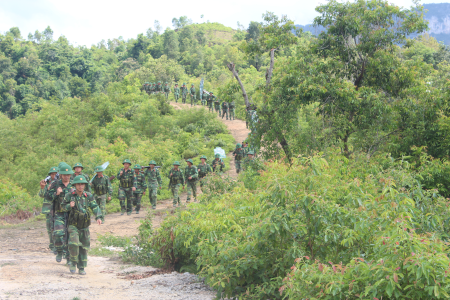Armed Forces of Cao Bang Province bring into play their core role in building the defensive zone
Cao Bang is a mountainous province in Northeast Vietnam. It has 330 kilometres of boundary line with Guangxi Province, China and holds a strategic position in the defence posture of the 1st Military Region and the whole country. Clearly perceiving that importance, over the past few years, the province’s armed forces have constantly brought into play their leading role in the establishment and operation of the defensive zone. The military organization serves as a nodal agency to collaborate with departments, branches, unions, and localities in advising and implementing plans in a comprehensive, focalized manner while applying regulations and mechanisms flexibly, creatively and in accordance with specific areas, thus bringing about many positive outcomes in the building of defensive zone. Capabilities of the defensive zone are strengthened. Military posture is established in congruence with features of each area and ensures increasingly strong defence in depth. The combination between the socio-economic development and the strengthening of defence and security is increasingly rigorous. Mechanisms for leadership and management of party executive committees and authorities at various levels operate effectively. Local armed forces are developed robustly and possess integrated quality and high readiness.
 |
Sr. Col. Hoang Van Huu addressing the Determined to Win
Emulation Congress |
To attain those results, military organisations at all levels have well performed their advisory role in helping party committees and authorities to lead and instruct the building of firm defensive zone. On the basis of deeply grasping resolutions and directives of higher echelons, especially the Politburo’s Resolution 28-NQ/TW (10th tenure), Decree 152/2007/NĐ-CP and Decree 02/2016/NĐ-CP of the Government on building defensive zones, the Province’s Military Command takes initiative in collaborating with departments, agencies and industries to advise the Province’s Party Committee and People’s Committee to promulgate resolutions, directives, plans, projects, etc., on local defence and military work. At the same time, it concretises mechanisms, regimes and policies and implements Law on National Defence, Law on the Militia and Self-Defence Force, Law on Military Service, etc., to create legal foundation for localities and units to facilitate unitary execution in the entire province. The province, so far, has completed the Project on building defensive zones for the 2015-2020 period with a vision towards 2030; General planning of combining defence and security with socio-economic development for the 2016-2020 period; Planning of projects in support of national defence, etc., to provide the basis for mobilising resources to develop capabilities within the defensive zone.
As a result of dispersion of people, who mostly belong to ethnic minorities, have uneven intellectual standards, and are embroiled in backward practices, in order to bring into play integrated strength of all elements and forces in the building of defensive zones, the armed forces advise the province to attach importance to consolidating and enhancing operation quality and effectiveness of the political system in association with stepping up the provision of defence and security education and the strengthening of political, moral capability in the defensive zone. Realising Resolution of the 18th Provincial Congress of the Communist Party, the province requests party committees at all levels to ensure that every village has party members and party cells. Accordingly, on the one hand, it instructs that some localities refrain from forming party cells in communes’ offices. Instead, they send their party members to villages. On the other hand, military and border organisations seek to deploy their cadres to the party committees and authorities at grass-roots levels. Priorities are given to consolidating the political system in border communes and key areas and promoting the development, training and cultivation of party members. Consequently, over the past 5 years, all of the province’s villages have had party cells, in which over 90 per cent are graded as pure and strong.
The Military Command advises the province to conduct education and dissemination of defence and security knowledge in a regular and effective manner. Apart from promoting regular propaganda, localities and units actively carry out many special propaganda activities on the occasion of major political events of the country and localities. Content and methods of propaganda are applied flexibly, creatively and in line with people’s intellectual standard and custom, ensuring the “fundamentality, practicality, and effectiveness.” The province provided training for over 37,000 cadres at different levels; wrote over 400 columns and 6,500 articles to report local defence and military activities in the 2008-2018 timeframe. These articles were broadcast by mass media, which contributed to raising forces and people’s awareness of this mission. In addition, the province instructed agencies to well execute policies, especially those pertaining to ethnic minority and religion; enhanced the prevention and control of crime and social evils and thrift practice; increased citizen reception and interaction; organised traditional festivals, etc., to create joyfulness and solidarity among the people and strengthen their confidence in the Party and State.
 |
| The provincial reserve force’s field training |
More than 90 per cent of the area in Cao Bang province is covered with high mountains, which causes much difficulty for people’s life. To strengthen economic capability in association with the development of military posture within its defensive zone, the province’s armed forces have advised the Province’s Party Committee and People’s Committee to closely involve defence and security in each socioeconomic sector. Accordingly, the province has directed agencies and localities to amend general planning for socioeconomic development on the basis of defence, security posture; take advantage of their natural conditions to develop tourism, foreign interaction, mining, metallurgy, hydropower, and so forth. Therefore, many industrial parks and hydropower plants have been built. Transportation, telecommunications and banking services have been strengthened, thus promoting trade within the province and beyond. The province has also increased investment and exploited tourism of the relics of Pac Po, Tran Hung Dao forest, Ban Gioc waterfall, etc., while consolidating healthcare network in association with military-civil medicine programmes; and improving and widening traffic system to better satisfy people’s need and gradually remove barriers to regional connectivity. Moreover, the province has actively detected and disarmed bombs and mines to widen cultivation land and establish new village adjacent to border; and instructed districts to collaborate with the 799th Economic-Defence Division to effectively implement economic, defence projects in the area. As a result of those efforts, the economy is developed in the right direction. People’s living standard is greatly improved. A number of communes are recognised to reach the standards for new-style countryside. The human resources for military service in the area are maintained. Traffic and transportation become easier.
To fulfill its leading role in building defensive zone, the province focuses on making its armed forces “adept, lean and highly efficient”. Accordingly, it regularly staffs the standing forces, particularly the party committees and commanders at all levels; gives priority to providing sufficient military cadres for border districts and communes; enhances cultivation of cadres, political, ideological education, and combat training to ensure their advisory capacity for party committees and authorities at all levels and mission accomplishment. At the same time, it is imperative to attach importance to quality of recruitment and well conduct military enrolment to generate long-term human resources and address the shortage of military cadres. Additionally, the province successfully develops its reserve and militia and self-defence forces with a focus on units in charge of emergency and high readiness; and regularly assesses production and repair capacity of industrial enterprises in the area to mobilise them in case of emergency. Furthermore, the province has paid due regard to establishing the military posture. Its military command cooperates with agencies, departments, branches, and localities in implementing land border demarcation and border marker planting to protect land reserved for national defence and natural terrain of military value. On such basis, the province mobilises resources to construct works in combat, rear, logistics, and technical bases; strengthens communication routes in key areas; takes advantages of, renovates and improves the system of caves; consolidates border patrol routes, etc., to create an uninterrupted, thorny posture.
The situation in the area and along the boundary line always risks and witnesses many complex issues, including border encroachment, illegal cultivation and habitation, illegal border crossing, smuggling, dissemination of strange religions, and so on. To ensure political security, especially border security, the province’s armed forces always well abides by regulations on coordination and perceives and correctly foresights situations to advise party executives and authorities at various levels on instructing their units to address defence, security, and disaster situations and forest fire in a timely and effective manner. It is also necessary to investigate and keep files on major areas in terms of security; monitor and deter illegal proliferation of religion; speed up the movement “Self-control of boundary lines, border landmarks, and security and order of hamlets in the border areas” in association with models of homeland security protection; regularly send the armed forces to hamlets to lend its support to people; safeguard festivals in association with strengthening security in key areas, etc., contributing to firmly preserving border sovereignty, political security, and social order and safety and preventing unforeseen situations and “flash points” in the area. To successfully execute diplomatic work and people-to-people interaction in the border areas, especially the Border Guard’s foreign relations, the province grasps and successfully carries out the Government’s Decree No.89/2009/NĐ-CP, dated 19 October 2009, on the Border Guard’s diplomacy, and the agreement on cooperation between border guards of the two countries, thereby regularly exchanging information and opportunely and effectively resolving incidents happening along the boundary lines or relating to the two countries. Drawing from experience of the past 4 Vietnam-China border defense friendship exchange programs, in 2018, the Military Command, along with the Border Guard Command, advised the provincial authorities to successfully host the 5th Exchange Program, which was appreciated by the Ministry of National Defence.
Achievements and experience in the building of the defensive zone by Cao Bang province in recent years are drivers for encouraging its cadres and soldiers to continue to better perform this important mission, contributing to firmly safeguarding the Homeland in any situations.
Senior Colonel Hoang Van Huu, Member of the Provincial Party Committee’s Standing Board, Chief of the Provincial Military Command